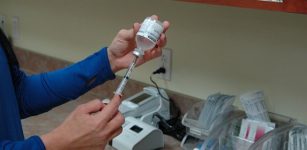Should Anti-Vaccination Nurses be Prosecuted?

A small number of nurses and midwives who have been disseminating anti-vaccination advice on social media could be prosecuted for sharing “false or misleading” information.
The Nursing and Midwifery Board of Australia (NMBA) has urged patients and members to report professionals who publish anti-vaccination information in contravention of health authority protocols.
The NMBA has warned:
“Any published anti-vaccination material and/or advice which is false, misleading or deceptive which is being distributed by a registered nurse, enrolled nurse or midwife … could result in prosecution by the Australian Health Practitioners Regulation Agency.”
Part of the NMBA’s role is to implement guidelines and competency standards regarding nurses and midwives in Australia. These include the provision of information to the public regarding public health issues. The NMBA says it, “expects all registered nurses, enrolled nurses and midwives to use the best available evidence in making practice decisions”.
In the context of immunisation, the standards are contained in the Australian National Immunisation Handbook.
Anti-vaxxer nurses
Melbourne midwife Belinda Henkel is reported to have told the media that she will not remove anti-vaccination information from her personal Facebook Page.
Another member of an anti-vaccination Facebook group pledged to defy the NMBA’s warning, saying, “I’m a nurse and will continue to say what I believe about vaccines. They can shove their guidelines up there (sic) ass.”
Another member, Pamela O’Connor posted information claiming that vaccines can cause autism, brain damage and even death, but has agreed to remove the posts for fear of losing her job.
Ms O’Connor says she knew a young woman whose mental health declined after having the cervical cancer vaccine.
“I have seen clear evidence from personal experience,” she said. “I don’t know what the stats are on it (but) for me that’s a concern.”
Anti-vaccination movement
The anti-vaccination movement has gained significant traction over the past two decades, especially after 1998, when Andrew Wakefield published a paper in the Lancet reporting case histories regarding 12 children who were said to have experienced autism spectrum disorders as a result of the MMR vaccine.
Many, however, have criticised the study for a number of reasons:
- Mr Wakefield had previously negotiated a contract with lawyer Richard Barr to find a “new syndrome” to profit from a speculative class action lawsuit against drug companies. Wakefield charged 435,643 pounds (then about $750,000 US), plus expenses, to find this syndrome, giving him a financial interest in the research claims.There had been no reported links between the MMR vaccine and autism before Wakefield’s study, and it was paid for by a law board to research a possible link.
- “The prime objective is to produce unassailable evidence in court so as to convince a court that these vaccines are dangerous,” the lawyer reminded the doctor in a confidential letter, six months before the Lancet report. Wakefield had even claimed the existence of what he was planning to call ‘autistic enterocolitis’ before he performed his research.
- Wakefield had a conflict of interest in so far as, before announcing the link, he filed a patent on products, including his ‘safer vaccine’ which would only profit if confidence for existing products was diminished. Wakefield was already negotiating with venture capitalists for investment into a replacement for MMR before his research had been finalized.
- 12 patients is an insufficient sample to draw reliable scientific conclusion. Moreover, nearly all of the children were selected through MMR campaign groups and most of their parents were already clients of Barr’s, rather than being randomly selected.
- Wakefield had repeatedly changed, misreported and misrepresented diagnoses, histories and descriptions of the children, which made it appear that the syndrome had been discovered. No subsequent researchers has been able to reproduce Wakefield’s findings or confirm the hypothesis of an association between the MMR vaccine and autism.
As a result of these and other issues, the Lancet retracted the publication and Wakefield was ultimately barred from practicing medicine in the UK
Dangers
There are concerns that anti-vaccination publications could lead to a decline in vaccinations for common conditions like measles and mumps, and a corresponding rise in serious injury and death.
There are also fears of a re-emergence in previously controlled conditions. “Immunisation saves lives,” AMA president, Dr Michael Gannon says, “That is an undeniable fact.”
According to the World Health Organisation, vaccinations prevent up to three million deaths every year from diphtheria, tetanus, whooping cough and measles.
While it may seem extreme to punish health professionals for disseminating information which they genuinely believe, many believe the dangers of such information call for sanctions to be imposed.






